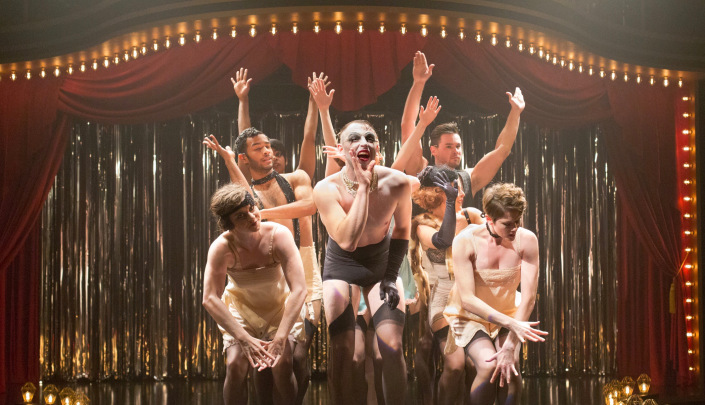
Cabaret by John Kander, Fred Ebb and Joe Masteroff. Directed by Matthew Decker, Arden Theatre, September 2017.
Never has Cabaret seemed so timely as in the new production by Matthew Decker at the Arden Theater.
When Joe Masteroff wrote the script in 1966 with Fred Ebb supplying lyrics and John Kander the music, we all thought it was a look backward at the rise of Naziism in Berlin around 1930. Now we see it as a warning about current threats. No lines specifically name Putin, Trump or any neo-Nazi, but the implication is clear when we witness the undermining of democracy and the intolerance towards those who are labeled as “not real Germans.”
This production emphasizes the flamboyant, gender-bending nature of Berlin nightclubs during the Weimar Republic years. John Jarboe, an experienced Fringe director and performer, gives us a cross-dressing Emcee who is even more outrageous than Alan Cumming, who starred in the 1993 Broadway production.
There’s debate about the superiority of the original 1966 Harold Prince production versus the 1993 Sam Mendes. The original portrayed the Kit Kat as a popular night club which was frequented by all types of patrons, a democratic mixture of gays and straights, Berliners and visitors like young Cliff who is a new arrival. Right at the start the Emcee says, “Every night we have to battle with the girls to keep them from taking off all their clothing.”
The Mendes version depicts a specifically gay club, thus recalling that homosexuals, as well as Jews, were targets of the Nazis. The original concept by Hal Prince presented an Emcee who was a pitiful bad-taste singer-comic, and in the 2nd act he personified all the Germans who embraced Hitler. In the original version he becomes a Nazi, while in the more recent concept he becomes a victim. Both approaches have merit.
Decker uses the Mendes script and designed this production to bring the audience even closer to the stage, with some patrons actually seated at small cabaret tables. Cast members come and go through the audience, and some of us who sat up front were even pulled into the action.
John Jarboe is strong and authoritative as the Emcee, thus setting up the horrible dissonance with how he’s going to be treated when the Nazis take over his country. A dash of vulnerability would make him even more effective.
Almost all of the supporting roles are very well cast. Daniel Fredrick is endearing as Cliff, Christopher Patrick Mullen is an attractively shady Ernst. Suli Holum is exceptionally strong as Fräulein Kost. Kenny Morris is the tragic Jewish fruit vendor, Herr Schultz, and Mary Elizabeth Scallen is a touching Frau Schneider. Charissa Hogeland, however, is a weak Sally Bowles. She gives no indication of why Cliff would be fascinated with her. Also, Sally would make a stronger impression if she appeared sluttier, dependent on drugs, and desperate.
Her best moment is her excellent rendition of “Come to the Cabaret” which she sings sardonically and fearfully, not triumphantly as some others have done in the past.
Decker directs with specificity and dramatic tension. The best innovation in this version is the final scene, where the Emcee removes his outer clothes to reveal a striped suit like those worn by the prisoners in concentration camps. An expressive set for the Kit Kat Club is designed by David P. Gordon. Maria Shaplin did lighting and Jorge Cousineau the sound design. Alex Bechtel leads the lively band and Jenn Rose directs the crucial choreography in the tuneful score that includes “Willkommen,””Come to the Cabaret,””Maybe This Time” and the scary “Tomorrow Belongs to Me.”